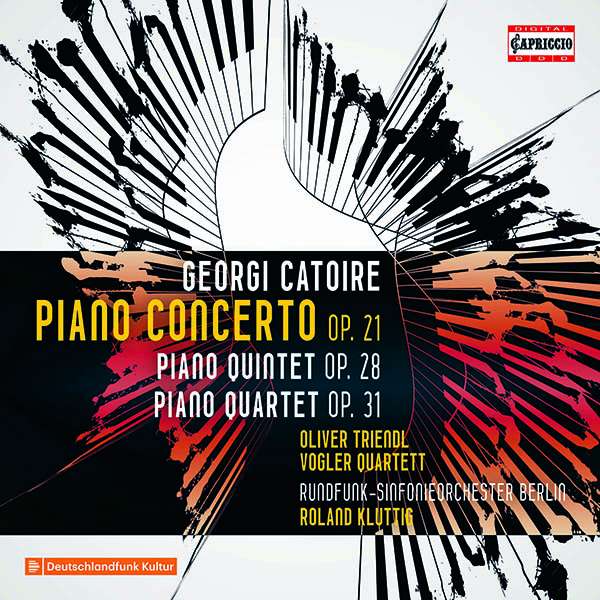 Georgi Catoire: Klavierkonzert op. 21 + Klavierquartett op. 31 + Klavierquintett op. 28; Oliver Triendl, Klavier, Vogler Quartett, Rundfunk-Sinfonieorchester Berlin, Roland Kluttig; 1 CD Capriccio C5403; Aufnahmen 2019/2020, Veröffentlichung 01/2021 (78'21) – Rezension von Remy Franck
Georgi Catoire: Klavierkonzert op. 21 + Klavierquartett op. 31 + Klavierquintett op. 28; Oliver Triendl, Klavier, Vogler Quartett, Rundfunk-Sinfonieorchester Berlin, Roland Kluttig; 1 CD Capriccio C5403; Aufnahmen 2019/2020, Veröffentlichung 01/2021 (78'21) – Rezension von Remy Franck
Auf dieser CD erklingen zwei Kammermusikwerke des 1861 in Moskau geborenen und 1926 auch dort verstorbenen Komponisten Georgi Catoire sowie sein einziges Klavierkonzert, dessen komplexer erster Satz länger ist als die beiden anderen, ein romantisches Andante cantabile und ein brillantes Finale. Die Musik ist feurig, extrovertiert und erinnert mit glänzendem Klavierpart und ausladenden Orchesterlinien an Tchaikovsky und Rachmaninov. Die hochfliegende Musik ist in einer eindringlichen Interpretation zu hören.
Die beiden Kammermusikwerke haben einen ganz anderen Charakter, sie sind im Laufe des Ersten Weltkriegs entstanden und viel leidenschaftlicher und emotionaler.
Dem aufgewühlten ersten Satz des Quintetts folgt ein Andante mit bohrend-schmerzlichen Melodien. Wollte Catoire die trübe Stimmung vielleicht mit einem Allegro con spirito e capriccioso verjagen? So ganz gelang es ihm nicht, und das Quintett mit Oliver Triendl und dem Vogler Quartett tut nichts, um das Stück unbeschwert werden zu lassen.
Ähnlich schwermütig sind die beiden ersten Sätze des Klavierquartetts von 2016, während das Allegro molto etwas freier und optimistischer daher kommt, jedoch nicht ohne wehmütige und aufgewühlte Einschübe, die den Satz – und das wird in dieser ungemein rhetorischen Interpretation sehr deutlich – recht bizarr werden lassen.
Mithin ist diese CD ein wichtiger Beitrag, um Catoires Musik auf hohem Niveau zugänglich und unmittelbar attraktiv zu machen.
This CD features two chamber works by the composer Georgi Catoire, who was born in Moscow in 1861 and also died there in 1926. Both works she release with his only Piano Concerto, whose complex first movement is longer than the other two, a romantic Andante cantabile and a brilliant finale. The music is fiery, extroverted and with brilliant piano parts and sweeping orchestral lines clearly reminiscent of Tchaikovsky and Rachmaninov
The soaring music is heard in a poignant interpretation.
The two chamber works have a very different character. They were written during World War I and are much more passionate and emotional.
The agitated first movement of the quintet is followed by an Andante of piercingly painful melodies. Did Catoire perhaps intend to chase away the gloomy mood with the following Allegro con spirito e capriccioso? If so, he didn’t quite succeed, and the quintet with Oliver Triendl and the Vogler Quartet does nothing to make the piece lighthearted.
The first two movements of the 2016 Piano Quartet are similarly melancholic, while the Allegro molto comes across as somewhat freer and more optimistic, not without wistful and agitated interjections that make the movement quite bizarre like this uncommonly rhetorical interpretation impressively shows.
As such, this CD is an important contribution to making Catoire’s music accessible and immediately attractive at a high level.


















